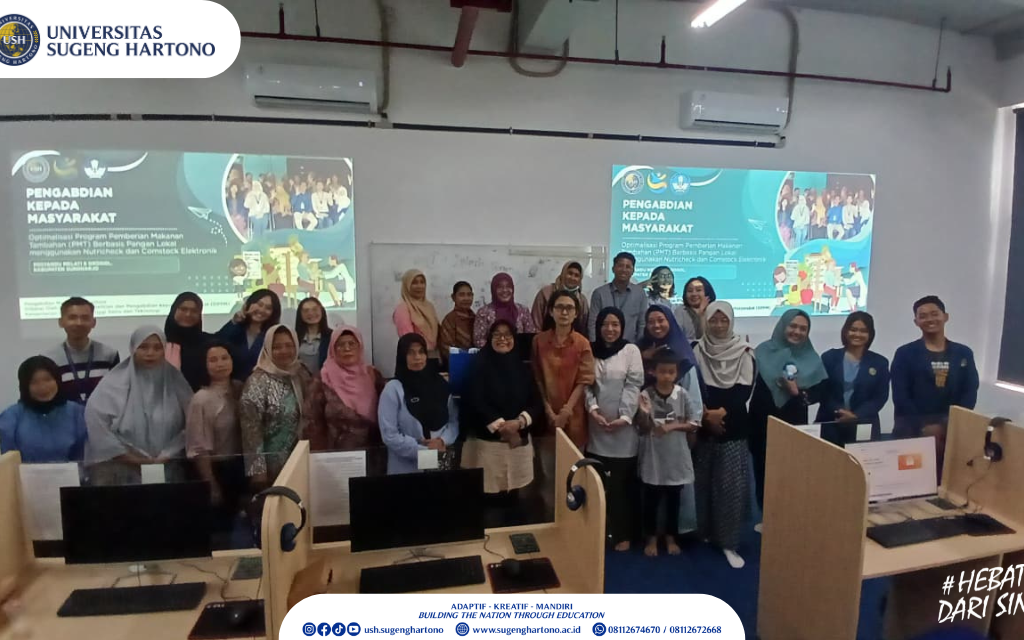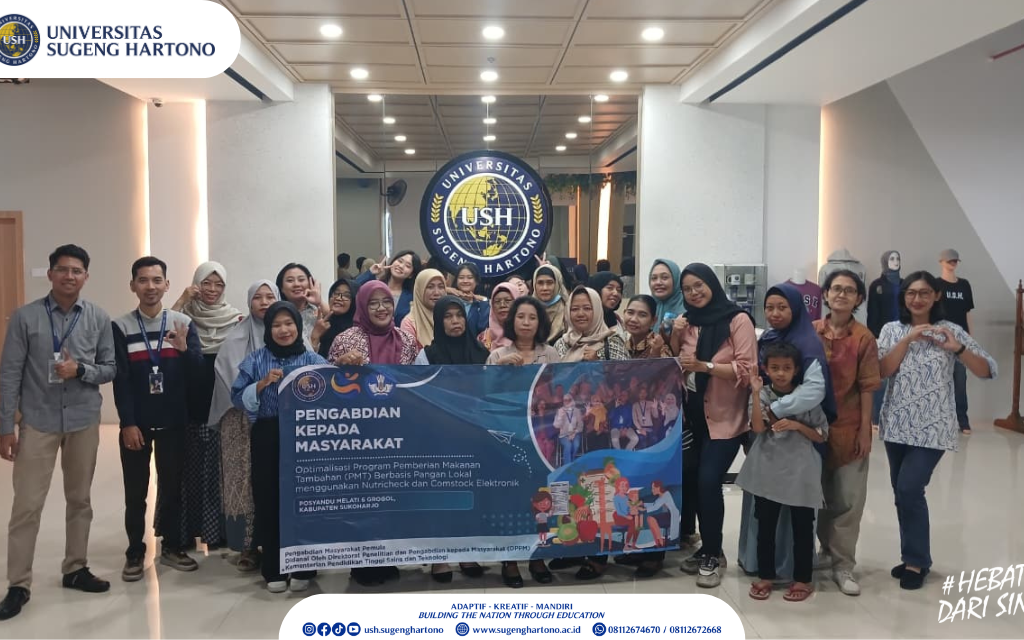
Sukoharjo, August 30, 2025 – Universitas Sugeng Hartono (USH) Reinforces Commitment to Stunting Reduction Through Community Service Program
Universitas Sugeng Hartono (USH) continues to demonstrate its commitment to supporting the national acceleration program for stunting reduction through a community service initiative conducted at Posyandu Melati 6, Madegondo Village, Grogol District, Sukoharjo Regency. This program focused on optimizing the implementation of the Supplementary Feeding Program (PMT) using locally sourced food and simple technology as supporting tools.
According to the 2022 Indonesia Nutritional Status Survey (SSGI), the national stunting prevalence remains relatively high at 21.6%, with wasting prevalence at 7.1%. These figures pose a significant challenge for Indonesia in achieving its stunting reduction targets outlined in the National Medium-Term Development Plan (RPJMN) 2020–2024. As the front line of health services for young children, integrated health posts (Posyandu) play a critical role, particularly through the implementation of PMT programs. However, challenges remain, especially related to the limited capacity of Posyandu cadres in preparing balanced menus, calculating children’s nutritional needs, and conducting data-based evaluations.
To address these challenges, the USH community service team launched a capacity-building program for Posyandu cadres. During the activity held on August 30, 2025, cadres received training on using the Nutricheck application to accurately calculate the nutritional needs of toddlers, as well as the Electronic Comstock tool to objectively evaluate children’s food consumption.
In addition, cadres were guided in developing 14 variations of PMT menus using local food ingredients readily available in their surrounding environment. These menus were not only nutritionally dense but also tailored to children’s taste preferences, making them more acceptable and easier to implement.
This initiative reflects USH’s strategic approach to empowering local health workers and enhancing the effectiveness of community-based nutrition programs, thereby contributing to national efforts in improving child health outcomes.

The Rector of Universitas Sugeng Hartono, Assoc. Prof. Jacob Febryadi Nithanel Dethan, Ph.D., emphasized the crucial role of higher education institutions in addressing public health challenges. “We want Posyandu cadres not only to provide supplementary food, but also to ensure that the food given meets the nutritional needs of young children. The use of simple technology can help cadres work more effectively and accurately,” he stated.
The results of the program demonstrated significant impact. Cadres’ knowledge increased by an average of 54% following the training. In addition, trial runs of the newly developed menus showed a high level of acceptance, with approximately 70% of toddlers finishing the food portions provided. Data collected using the Electronic Comstock tool also offered an objective overview of children’s consumption patterns, enabling cadres to make informed adjustments to future menus.
The head of the community service team, Alfan Ridha, explained that the initiative extends beyond one-time training and includes continued mentoring to ensure cadres become accustomed to using the applications and can independently develop innovative menu options. “With Nutricheck and Electronic Comstock, cadres now have tools to design menus that meet children’s nutritional needs and evaluate their effectiveness in real terms,” he stated.
The Head of Madegondo Village expressed his appreciation for Universitas Sugeng Hartono support in strengthening the local Posyandu program. “We truly feel supported by this initiative. It is our hope that by improving the capacity of Posyandu cadres, the quality of services will continue to improve, and stunting rates in our village will decline,” he said during his remarks.
This program also serves as a tangible implementation of Universitas Sugeng Hartono vision to be an institution that actively contributes to sustainable development, particularly in achieving Sustainable Development Goal (SDG) 2: Zero Hunger, and SDG 3: Good Health and Well-being.
Building on this success, Universitas Sugeng Hartono hopes similar programs can be replicated in other Posyandu centers, empowering more cadres to provide high-quality, locally sourced supplementary feeding. The synergy between higher education institutions, communities, and village governments is believed to be the key to reducing stunting and nurturing a healthy, intelligent, and productive generation of Indonesians.
